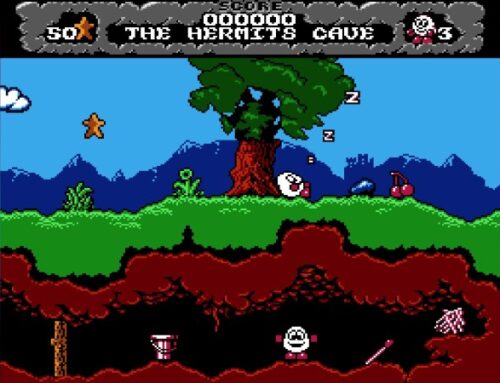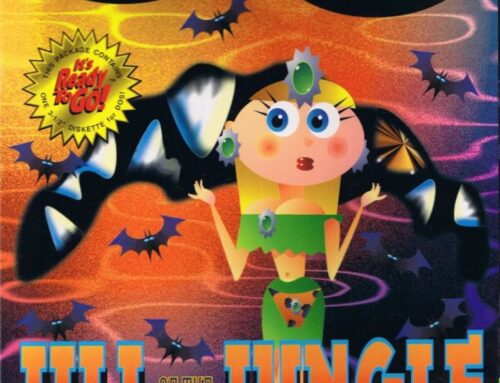There’s a bit of a trend in retro gaming coverage these days, and I’m not sure I like it all that much. I’m not going to point the finger to name and shame people today, but I do want to talk a bit about a general pattern that I feel we should probably try and break ourselves out of sooner rather than later.
That pattern is the tendency towards covering things from a negative perspective, or treating things from the earlier days of gaming as somehow a joke, worthy of mockery. Just recently I’ve seen a few too many retro gaming YouTubers that I used to enjoy completely fall off the deep end in this regard — and, to be frank, I’m just not interested in that sort of thing.

As an enthusiast of retro gaming, I’m more keen to find things to play that are at the very least worth talking about, and which in the best cases are worth deliberately spending substantial amounts of time playing; “this game from 198X that was released by a low-budget studio is shit” doesn’t really provide me with anything of value. “This game from 198X that was released by a low-budget studio is challenging to get into and doesn’t exactly push its host system, but is a worthwhile experience if you give it a chance,” however — now you’re talking.
Trouble is, negativity is closely tied in with clickbait these days — and in many cases I suspect that the YouTubers I’m referring to don’t necessarily want to focus exclusively on negative coverage of retro gaming. What they probably have seen is how consistently provocatively negative messages produce good viewing figures, and, if YouTube is their career, felt that this is the direction they need to go in order to remain competitive and profitable. I can’t really blame them for that; that’s more of a cultural, societal problem than necessarily the fault of the creators themselves.
Negativity works because it attracts two real types of people: firstly, the people who are on board with the negativity and want to have a good laugh mocking something or heaping scorn on it in some way; and secondly, the people who like the thing that is being talked about in negative terms, who nine times out of ten won’t be able to resist responding to said negativity in some manner. It’s an understandable reaction; if you particularly enjoy something and you see someone seemingly being spiteful or unfair towards it, you naturally want to defend it and set the record straight — even if you know no-one’s really going to listen to you.

By contrast, being more positive about something — and by that I also mean simply giving something a chance in some cases — can often attract a similar divide. That said, people who feel negatively about something being praised (or explored fairly) are, on the whole, much less likely to kick up a stink than in the reverse situation, and as a result, articles and videos that praise things, talk about the interesting things they do or simply analyse without judgement tend to pass by in the Internet equivalent of silence.
People feel less inclined to respond to this sort of thing in a passionate, impulsive sort of way. If you agree with the positive take, you just nod and smile; if you disagree, you only pop into the comments to say “actually, this thing you like is shit” if you’re the absolute worst type of person, in my experience.
All this ties in with your reasons for getting into retro gaming as a hobby. Personally speaking, my interest in retro gaming comes not only from a sense of nostalgia and memories of enjoying many of these games “first time around”, it also comes from an understanding that something enjoyable is truly timeless, regardless of whether or not the technology on which it is built is primitive or not. With that in mind, when I play something new, I tend to find myself making a specific effort to “find the good” in it, regardless of what the current popular opinion of it is, or what the commercial and critical reception of it was back when it first came out.
To put it another way: what is the point of exploring something if you’re going in with the mindset that “this is probably going to be shit”? If you do that — and then prove yourself right — you’re just wasting everyone’s time, really. Sure, it might get a giggle out of a few people if you’re good at mocking things — but long-term, there’s little real value in this sort of thing.

There are exceptions, of course; some games really are of poor quality. But every game at least deserves a chance without assumptions being made about it — and that’s where a lot of people in the retro gaming field seem to struggle a bit these days. There’s a difference between “Atari 2600 Pac-Man is shit” and “Atari 2600 Pac-Man failed because it wasn’t really what was promised — but here’s what it does do.”
By taking this approach, I’ve found myself experiencing and genuinely loving a lot of things that other people haven’t even tried once — and that makes for interesting conversations, articles and videos. It doesn’t always make for great viewing figures, for the reasons that we’ve just discussed, but it does tend to attract, overall, a better quality of discussion.
Over on my personal YouTube channel, for example, I cover retro gaming right back to the Atari 2600 era with the intention of giving each and every single one of them a fair shot at convincing me it’s worth spending some time with — and it’s pretty rare that I’ve come away from something feeling that it is completely irredeemable. As a result, the general standard of conversation in my comments section is very high, even if the quantity of comments might not be as high as some other channels.
And I’ve found that as a result of my approach, even in cases where people didn’t like the games I ended up enjoying as much as I did, things are kept respectful and articulate rather than aggressive and incoherent — in many cases, I’ve ended up learning things I didn’t know, too.

It’s a long-term approach, though; for a good few years I was making videos with little to no participation in the comments section from anyone, and it’s only probably in the last year or so that I feel like there’s been a consistent presence from any semblance of a “community” beneath the videos. It takes time to establish this sort of situation, whereas if you pump out a video that says “Jet Set Willy is shit” you’re going to get a whole torrent of “engagement” as a result — and so far as YouTube’s notorious “algorithm” is concerned, that means your video is “better”.
That doesn’t necessarily mean it’s not worth the effort, though. Any sort of fundamental change in attitude towards something takes time — and I can’t help but feel that a shift in a more positive direction would, in the long term, be better for everyone with an interest in retro gaming. It’d be better for efforts to preserve, catalogue and celebrate games from older generations of hardware — and it’d be a whole lot better for the mental health of both creators and audience alike, since it would allow the relationship between them to be based more on mutual enjoyment and less on being adversarial.
Most people want to take what is perceived as the “easy” (or at least “quick”) route to success, though, and that’s why I suspect I may just be dreaming with the idea I’m outlining above. But it doesn’t hurt to mention it — and it doesn’t hurt to stick to my own guns in this regard. If just one or two people follow, any improvement is better than no improvement, I say.




